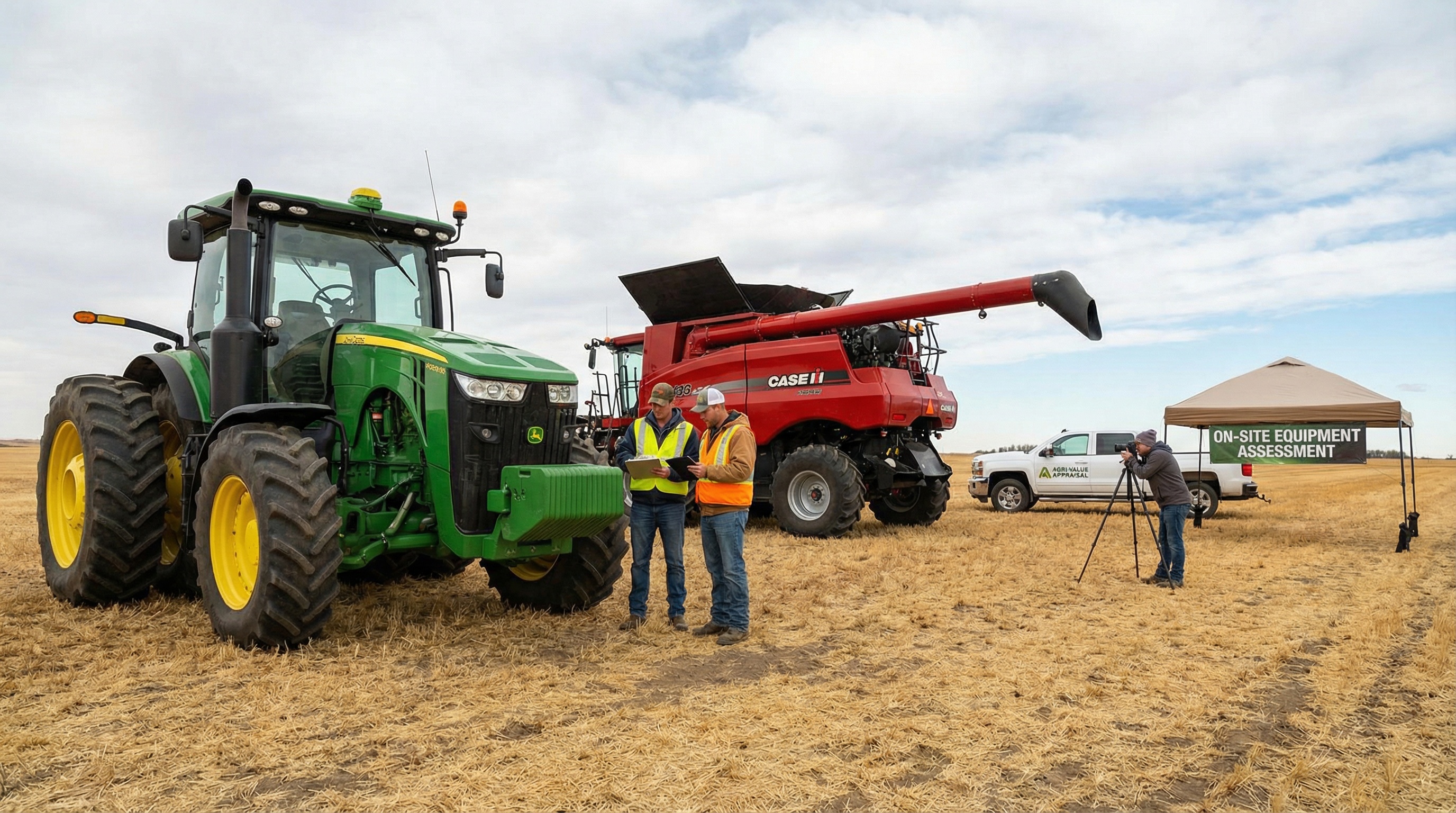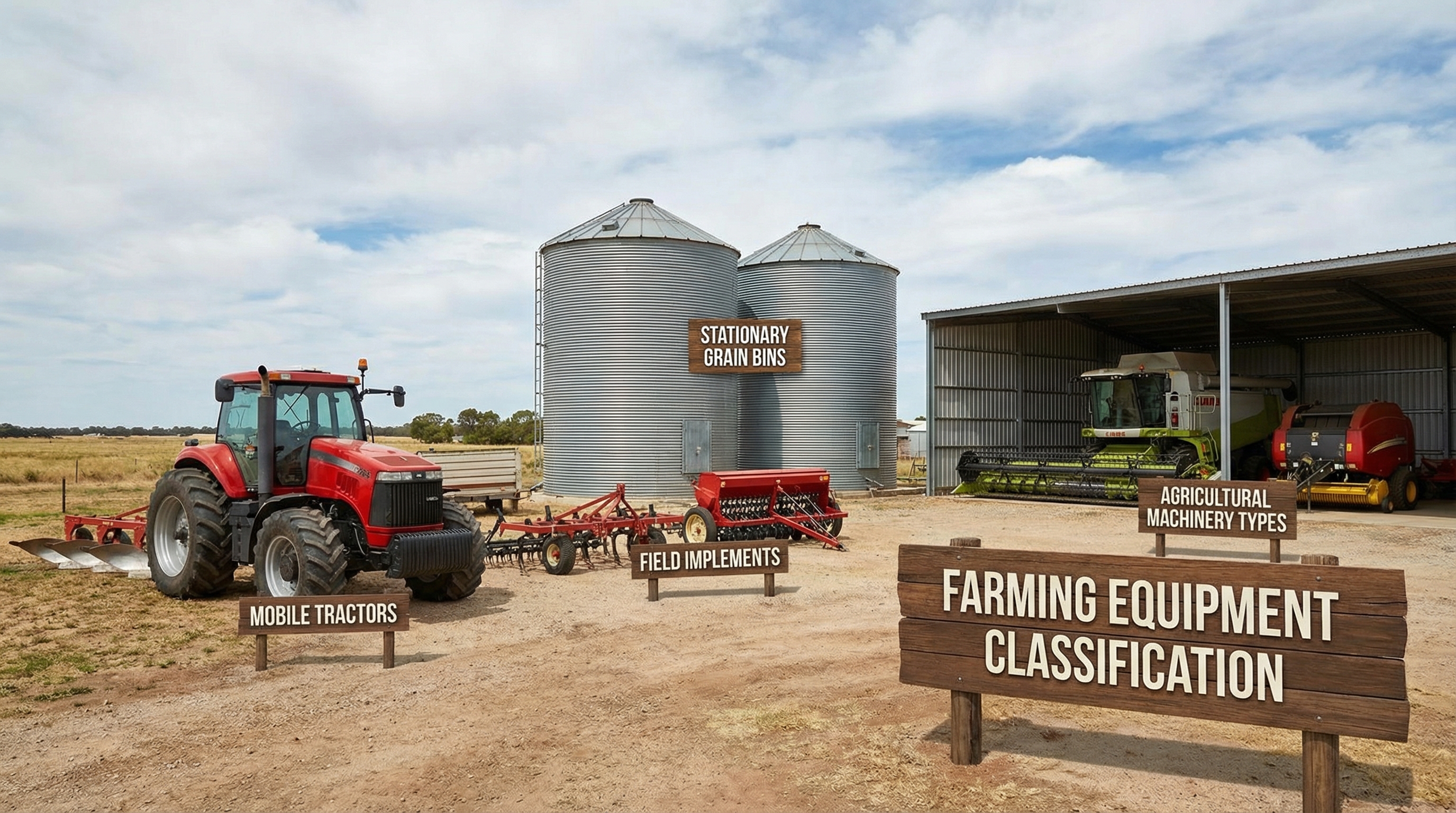







Getting your farm equipment appraised can feel overwhelming, especially when thousands of dollars are on the line. Whether you're securing a loan, updating insurance coverage, or settling an estate, the accuracy of your appraisal directly impacts your financial outcome.
A farm equipment appraisal is a professional assessment that determines the fair market value of agricultural machinery and implements. This includes tractors, combines, planters, harvesters, and other movable equipment used in farming operations. The process involves a certified appraiser examining your equipment's condition, researching comparable sales, and providing a defensible valuation report.
Quick Answer: Most farm equipment should be appraised every 1-3 years, with certified appraisers typically completing the process in 3-10 business days depending on the number of items and complexity of the evaluation.
The key to getting an accurate, defensible appraisal lies in asking the right questions upfront and preparing thoroughly. This guide walks you through exactly what to ask potential appraisers and how to set yourself up for success.
Not all farm equipment requires professional appraisal, but certain categories definitely benefit from certified evaluation. Mobile machinery like tractors, combines, and self-propelled implements typically need appraisal for loan collateral or insurance scheduling. Field implements such as planters, cultivators, and balers also warrant professional assessment, especially when their combined value exceeds $50,000.
Stationary equipment presents an interesting case. Grain bins, irrigation systems, and portable buildings often fall into a gray area between equipment and real estate appraisal. Generally, if the item can be moved without significant structural modification, it counts as equipment.

Your lender or insurance company will typically specify which items need appraisal. For estate planning or divorce settlements, you'll want to include any equipment worth more than $10,000 individually or items that collectively represent significant value. Understanding when to hire a farm equipment appraiser can help you determine the right timing for your specific situation.
The timing matters too. If you're refinancing your operation, expect your lender to request appraisals on tractors, combines, and high-value implements. Insurance companies often require updated appraisals when adding equipment to scheduled coverage or after major claims.
Understanding what influences your equipment's value helps you prepare better and set realistic expectations. Physical condition tops the list of value drivers. An appraiser will examine external wear, check fluid leaks, test hydraulics, and review maintenance records. A well-maintained 10-year-old tractor can be worth significantly more than a neglected 5-year-old model.
Hours and usage patterns matter enormously. A combine with 800 separator hours commands a premium over one with 1,500 hours, assuming similar age and condition. Keep detailed records of operating hours, major repairs, and component replacements.
Technology and features add complexity to valuations. GPS guidance systems, precision planting capabilities, and emissions compliance can boost value substantially. However, outdated technology sometimes hurts resale value, even on otherwise solid equipment.
Market Reality: Regional demand varies dramatically. A cotton picker holds premium value in Texas but limited appeal in Iowa corn country, affecting both appraisal methodology and final values.
Market conditions fluctuate based on commodity prices, regional crop patterns, and dealer inventory levels. Your appraiser should research recent comparable sales, auction results, and dealer asking prices to establish current market value. They'll also consider local factors like dealer support, parts availability, and regional preferences for specific brands or configurations. For more insights on how technology is revolutionizing agricultural equipment appraisal, explore the latest industry developments.
The questions you ask upfront determine whether you get a defensible, accurate appraisal or encounter problems later. Start with credentials and experience. Ask specifically about their certification status, USPAP compliance training, and experience with your type of equipment. A certified appraiser should readily provide their credentials and explain their qualifications.
QuestionWhat to Listen ForAre you USPAP-compliant and certified?Should mention ASA, ISA, AMEA, or equivalent certificationHow much agricultural equipment experience do you have?Look for specific years and equipment categoriesWill this appraisal be accepted by lenders and courts?Should confirm USPAP compliance and legal defensibilityWhat valuation approaches will you use?Should explain market, cost, or income approaches
Next, clarify the inspection process. Will they visit your farm or work from photos? On-site inspections generally produce more accurate results, especially for older or specialized equipment. Remote appraisals can work for standard equipment in good condition, but make sure you understand the limitations.
Ask about their fee structure and timeline. Reputable appraisers typically charge flat fees for straightforward assignments or hourly rates for complex evaluations. Be wary of appraisers who quote fees based on equipment value, as this creates potential conflicts of interest. Learn more about the cost of farm equipment appraisal to set realistic budget expectations.
Finally, confirm what the final report will include. A proper appraisal report should contain detailed equipment descriptions, photographs, methodology explanation, comparable sales data, and clear value conclusions. The report should be addressed to you or your designated recipient and include all necessary limiting conditions and assumptions. For a comprehensive list of 10 essential questions to ask your farm equipment appraiser, review our detailed guide.
Proper preparation significantly impacts both the accuracy of your appraisal and the total cost. Start gathering documentation as soon as you decide to get an appraisal. You'll need basic identification information for each piece of equipment including make, model, year, serial numbers, and current meter readings.
Financial records help establish ownership and purchase history. Collect original purchase invoices, loan documents, and any lien information. If equipment is leased or financed, make sure your appraiser understands the ownership structure.

Maintenance documentation proves care and helps justify higher values. Gather service records, major repair invoices, and any rebuild documentation. Recent inspection reports or safety certifications also support your equipment's condition claims.
Take current, well-lit photographs from multiple angles before the appraiser arrives. Include close-ups of any damage, wear points, or recent repairs. If you're doing a remote appraisal, high-quality photos become even more critical for accurate assessment.
Pro Tip: Organize all documentation in a simple folder or binder. This preparation typically saves 1-2 hours of appraiser time, which directly reduces your costs while improving accuracy.
Location details matter more than you might think. Provide clear directions to each piece of equipment, especially if items are stored at different locations. Note any access restrictions, required safety equipment, or seasonal limitations that might affect the inspection schedule. Use our checklist for preparing your agricultural equipment for appraisal to ensure you don't miss any critical steps.
The appraisal process typically takes 3-10 business days from initial contact to final report delivery. Simple assignments involving standard equipment may be completed faster, while complex evaluations or large fleets require additional time. Your preparation directly impacts this timeline.
Getting your farm equipment professionally appraised doesn't have to be complicated when you know what questions to ask and how to prepare. Focus on finding a certified, experienced appraiser who understands your specific equipment and market conditions. Gather your documentation early, ask the right questions upfront, and you'll receive a defensible valuation that serves your needs whether you're dealing with lenders, insurance companies, or legal proceedings. To avoid pitfalls, review common mistakes to avoid during a farm equipment appraisal.
At AppraiseItNow, our USPAP-compliant appraisers specialize in agricultural equipment valuations accepted by major lenders, insurance companies, and courts nationwide. We combine decades of agricultural expertise with current market knowledge to deliver accurate, defensible appraisals that protect your interests.
Ask about their USPAP compliance, certification status (ASA, ISA, AMEA), and specific experience with agricultural equipment. Confirm they can provide defensible reports accepted by lenders and courts. Also inquire about their valuation methodology, data sources, inspection process, timeline, and fee structure to ensure they meet your specific needs.
Most farm equipment should be reappraised every 1-3 years for insurance and lending purposes. High-value equipment like tractors and combines may need more frequent updates during volatile markets or after major upgrades. Your lender or insurance company will typically specify their requirements for updated valuations.
A professional appraisal provides an unbiased fair market value assessment following USPAP standards, accepted by lenders, courts, and the IRS. A dealer trade-in quote reflects what a dealer will pay for your equipment, typically below market value to account for their profit margin and reconditioning costs. Appraisals are required for legal, financial, and insurance purposes.
Gather ownership documents (titles, bills of sale), technical details (make, model, year, serial numbers, current hours), maintenance records (service logs, repair invoices), and current photographs showing overall condition and any damage. Having this documentation ready reduces appraisal time and costs while improving accuracy.




